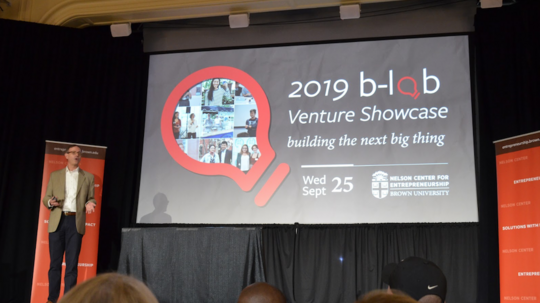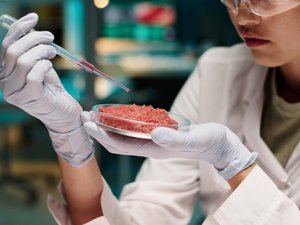
In part one of our coverage of the Breakthrough Lab Venture Showcase hosted by Brown University’s Jonathan M. Nelson Center for Entrepreneurship, we introduced the first seven startups in this year’s cohort. They included edtech and medtech startups, different software platforms and superfood companies, among others.
As a reminder, B-Lab is a unique, intensive 8-week accelerator program that supports student entrepreneurs developing high-impact ventures. It provide students access to high-level sector specific mentoring, business and technical support, focused programming and a dedicated co-working space.
Here are seven of the startups in this year’s cohort.They include ideas to make charitable giving easier for millennials, ways to combat emotional abuse in Madagascar and lab-grown leather.
Part two will run tomorrow, covering the remainder of participants.
Mena
When Francesca Raoelison lived in Madagascar, she was subject to frequent emotional and social abuse. But at the time, she had no idea; it was just the norm in the country.
She is not alone. According to UNICEF, 80% of children in Madagascar have experienced some form of emotional and psychological abuse in their household.
Raoelison’s company Mena looks to combat this problem with content that teaches children about social and emotional abuse, and how to spot it. It will use a community of peer educators to share and teach this content, which includes books about boundaries and body safety, videos about toxic relationships and workshops that will provide students with tools for what to do in these situations.
Mena is also partnering with organizations like the Social Emotional Learning Institute, which has successfully run programs like this in other countries. These organizations will allow Mena to use its content and tailor it to children in Madagascar. Mena plans to launch its first pilot in four schools in Madagascar in January. [Editor's Note: Raoelison was one of Inno's Under 25 recipients this year.]
Pillar
Millennials care about social issues and do want to see change. But being charitable is difficult for a variety of reasons: There are so many worthy nonprofits in the U.S.; it’s difficult to assess a charity’s impact; to trust that the money is being spent wisely and all of the solicitations from charities can hinder a relationship with a donor. Pillar is making charitable giving easier and more rewarding by assembling various nonprofits that are doing similar work into bundles, similar to the way index funds work. The company does extensive research when putting together bundles, and partners with industry experts with decades of experience in the nonprofit space, so donors can be assured their money is going to the right place. There was $286 billion in charitable giving last year, 11 percent of which was donated by millennials. Pillar will take a 2 percent fee on all donations they process. The company officially launched its platform last month.
BioLeather
The world population is expected to double in the next 60 years, leaving a crucial question for mankind: How will we support twice as many people on a planet with a finite amount of resources?
The answer is that the country will have to produce and purchase more sustainable products. And there is interest in doing this, considering that 73% of consumers would change their spending habits to reduce their environmental impact.
BioLeather is doing its part by creating a process to produce laboratory-grown leather. This leather would mimic that of the high quality leather currently created from the hides of cows, but it would be much less harmful to the environment.
The lab-grown leather would be created using a bioleather synthesis process, where a small skin sample, about the size of a quarter, is taken from the cow and then grown in a lab. This process could, in theory, be used for other industries, such as the fur industry.
The company has forecasted out a two year timeline that would involve getting patents, raising seed funding and then developing its first partnerships and seeing its first sales.
Resuscitech
While cardiopulmonary resuscitation, better known as CPR, can save lives, it is actually very ineffective, failing up to 80% of the time. The reasoning is because medical professionals have trouble adhering to the extremely precise protocols that are required to make CPR work.
Resuscitech is improving the process with a wearable CPR feedback device that will take the guesswork out of CPR by providing the exact depth and rate of chest compressions, so medical professionals can adjust to better adhere to protocols and switch off with another care provider if they feel fatigued.
Other existing devices are cost prohibitive, difficult to put on and easily become misaligned. The Resuscitech device is cheap to make, reusable and disposable. The projected market at hospitals all over the world is a little less than $80 million, but the company is considering expanding its device to meet military specifications and integrating the core technology into a smart phone app, which would increase its market size dramatically. The company is looking to raise a $250,000 seed round.
SelectEd
Chinese families are willing to spend huge sums of money to prep their children for a potential college career in the U.S.
But not everyone can afford these programs, and existing ones are often pretty lousy. For example: Chinese test prep companies and tutors can cost $30,000, and many tutors have neither studied in the U.S. nor not speak english fluently.
SelectEd is an online platform that pairs students with tutors through proprietary matchmaking and a rigorous tutor vetting process at a much lower cost. The company’s online platform is up and running, and currently generating revenue.
SelectEd has already won several awards in the U.S., China and Taiwan, and is planning to expand to India, Brazil and popular study abroad destinations such as the United Kingdom and Australia. The company also plans to eventually expand into career coaching and tutoring for other career programs. It would like to use part of its revenue stream to subsidize students who are unable to afford tutors. SelectEd is also gearing up to raise a seed round.
Grand
Despite their helpfulness for getting around, canes are not always well liked by the elderly population. Over 50% of assistive devices are abandoned, and 15% of these devices that are purchased are never used. Grand is trying to bring the cane — and eventually, other elderly mobility devices — back into style.
The company’s flagship product is a handmade cane made from domestic hardwood. It has a distinctive gap, which gives the cane a beneficial spring. The cane will be priced as a luxury $200 product, and has already tested positively online.
Grand is planning to eventually launch other products as well. The 60-year-old plus population is set to double in the next 30 years, and the mobility device market will reach $12.7 billion by 2023.
Primitive Labs
Primitive Labs is a materials company that repurposes biologically sourced raw materials and converts them into innovative plastics. These plastics have a range of interesting functions, from color change to smell change, and even to mechanical properties for the integration into consumer products of all different sorts.
The company was invited to participate as an exhibitor at ARS Electronica in Austria. It also recently secured a $250,000 seed investment from SOSV Accelerator and will be moving to San Francisco to continue its work. Primitive Labs is currently hiring as well.








